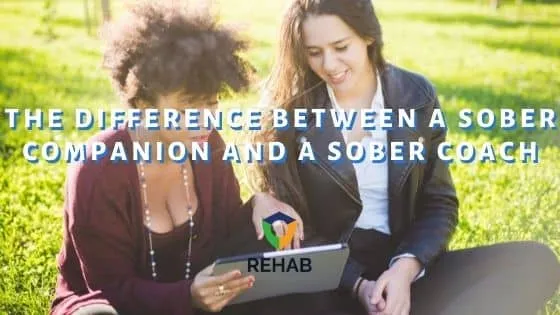Table of Contents
After spending anywhere from 30 to 90 days in a rehabilitation program with around-the-clock support, community, and quality care, you might be feeling nervous about returning to “the real world,” upon completing rehab. You’ve put in a lot of hard work, and you want to maintain your sobriety, but you might be concerned about your ability to do so without help.
There’s nothing wrong with wanting or needing a little bit of extra support while you transition back into your life. As you begin to transition out of rehab, there are many steps that you can take to help quell your anxiety and increase the likelihood that you will maintain long-term recovery.
The professionals at your rehab center will likely help connect you with community resources but what if you still feel like you need more help? Two often underutilized options for rehab aftercare include sober companions and sober coaches. But what exactly is the difference between a sober companion and a sober coach, and how could they each help you to stay sober?
What Do Sober Companions Do?
If you don’t feel ready for the full responsibility of navigating the world on your own while maintaining your sobriety, then a sober companion could be a good option for you.
A sober companion can provide that same intensive and focused care and attention that you received while you were in rehab. Many people become acquainted with their sober companion while they’re still in rehab as they begin the process of readying themselves for departure, but it’s never too late to find one if you feel you need the extra support.
While a sober companion may not monitor your every move, they can be available for you on an as-needed basis and will likely stay with you in your home. They can escort you to and from doctor’s appointments, or even parties where you know you may be tempted to drink or use.
No sober companion’s approach to helping you will be exactly the same. Some adhere strictly to the traditional modalities of 12-Step programs, while others may be more focused on mindfulness techniques or other holistic therapy practices.
Though a sober companion may serve a similar function as an AA sponsor, or even a close friend, the role they play in your recovery will be much more involved. A sober companion can help hold you accountable for removing drugs from your home, keeping track of who you associate with, helping you to integrate back into your family unit or to navigate relationships with loved ones, and much more.
Sober companions are usually not trained as therapists or counselors. Often, they are other recovered addicts who can help anticipate your needs because they know what you are going through.
What Does a Sober Coach Do?
A sober coach can also be a useful tool to utilize along your path to recovery. A sobriety coach’s aim is to inspire you to lead a happy, healthy, sober life through one-on-one coaching sessions.
These sessions could be conducted over the phone, via Zoom, or face-to-face. It’s likely that once you get out of rehab, you’ll need help in establishing new and healthy routines. Recovery coaches can help you to create a diet and exercise plan that serves your long-term goals of holistic wellness; both mental and physical.
Your recovery coach may also help you to tackle sticky situations that arise in early recovery or develop problem-solving skills. They may also aid in the setting of both long and short-term goals. Like sober companions, they too can help you to navigate your relationships with friends and family as you reintegrate into your old social circles.
Essentially, a sober coach can serve as a recovery mentor. Ideally, they will supplement, and fill in the gaps that might be left by more traditional counselors focused on providing CBT or DBT who can only meet weekly or bi-weekly.
What Is The Difference Between a Sober Coach and a Sober Companion?
While both provide similar services, ultimately the two are very different. A sober companion provides much more intensive care than a sober coach. Both can help to supplement what should be a robust aftercare program. If you feel like you need more people in your corner after rehab, either of these addiction treatment professionals might be able to help.
Ultimately, only you can decide which of these options is right for you. You know best what level of care you will require post-rehab and are entitled to whatever you need in order to feel comfortable in maintaining your sobriety.
If you need help in exploring any of the many avenues available to you as you start your journey down the road to recovery, contact us at Rehab Recovery Center. Whatever you decide, we can help you find a reputable sober companion or a sobriety coach who will perfectly fit your needs and help you to achieve and sustain a life of freedom from addiction. Don’t wait any longer to get the guidance you need and call today.
Get Help Today
Don’t go through the process of recovery alone. There are people who can help you with the struggle you’re facing. Get in touch with one today.


